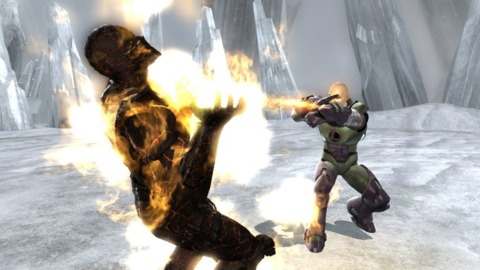Midway shareholder suit dismissed
Despite suspicious timing of stock dump, judge finds no evidence executives' "puffery" deceived public to inflate share price of doomed publisher.
After years of financial turmoil, Midway Games finally went bankrupt in February. While the bankruptcy proceedings have wrapped up with the bulk of the business sold to Warner Bros., the fallout from the publisher's prolonged collapse continues.

The latest news surrounding Midway's demise wraps up a lawsuit alleging that executives--including former CEO David Zucker--willfully deceived shareholders about the company's financial well-being in order to artificially inflate its stock price.
Last week, a district court judge dismissed the suit, saying the shareholders "failed to show that defendants said or did anything more than publicly adopt a hopeful posture that its strategic plans would pay off. Such preening for the financial press is classic puffery. Even if these statements were not puffery, plaintiffs cannot establish that they were false when made." (Emphasis in original.)
The shareholders pointed to two specific events to back up their allegations, the first of which was the August 2005 purchase of Australian developer Ratbag Holdings. The publisher at the time said the acquisition would bolster Midway's in-house development capabilities, but it shuttered the studio just four months later, which contributed to the publisher's $13 million in restructuring charges for the year.
The other event mentioned in the suit was the cancellation of Midway's contract with developer Stainless Steel for the PC real-time strategy game Rise & Fall: Civilizations at War. Midway yanked the project from (quickly shuttered) Stainless Steel in November of 2005 and handed the game off to its own San Diego studio. The shareholders allege the move cost Midway millions in additional development costs that it concealed from shareholders.
The judge was swayed by neither charge, faulting the shareholders for failing to properly back up their allegations. However, the judge did appear to side with the shareholders in their suggestion that executives knew a rumored acquisition of the company by Viacom would not go forward before then-majority shareholder Sumner Redstone declared as much in late December 2005. Specifically, the judge frowned upon the executives collectively selling more than $10 million in Midway shares over the week before Redstone publicly squashed the acquisition rumors and used his own majority stake in the company as collateral for a personal loan, actions which sent Midway stock spiraling downward.
"The timing of Defendants' extensive stock sales vis-a-vis Redstone's announcement does seem a little too perfect," the judge determined, "and defendants may well have possessed and traded on knowledge of Redstone's plan before it was announced to the public."
However, even if that were proven, the judge said it would not have supported the shareholder's actual allegations of misleading shareholders to falsely inflate the publisher's price and so would not have helped their specific case.
Got a news tip or want to contact us directly? Email news@gamespot.com
Join the conversation